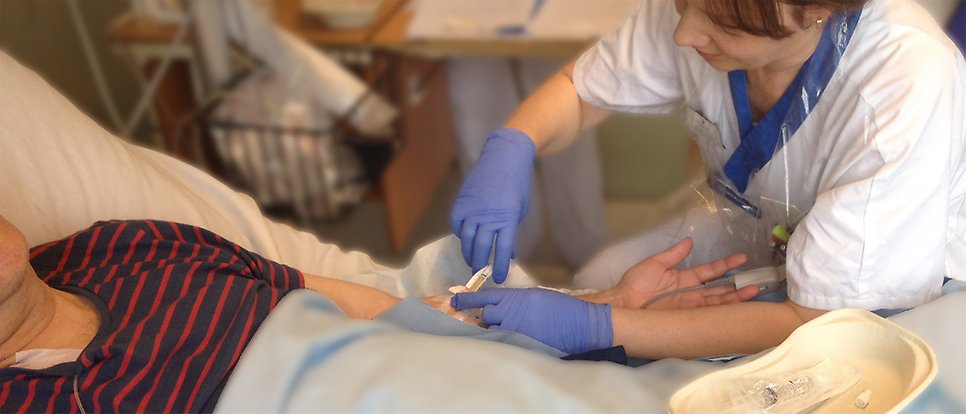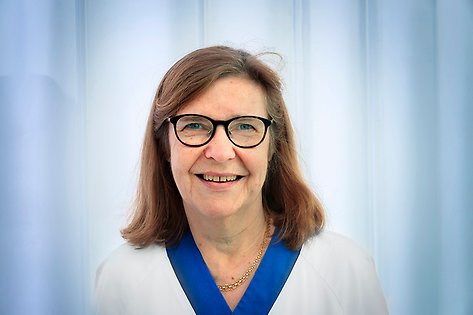Ten years of pioneering immunotherapy

The first CAR T-cell treatment in Europe was performed at Uppsala University Hospital in 2014. Photo: Uppsala University Hospital.
Ten years ago, the first patient in Europe received groundbreaking immunotherapy, known as CAR T-cells, at Uppsala University Hospital. Today, CAR T-cells are used to treat several cancers, such as lymphoma, acute lymphoblastic leukaemia and relapsed malignant lymphoma. The treatment has also proved to be effective in patients with myeloma and inflammatory diseases such as SLE and MS.

Gunilla Enblad, Consultant Physician and Professor of Oncology at Uppsala University Hospital/Uppsala University. Photo: Uppsala University Hospital.
Ten years ago, the first patient in Europe received groundbreaking immunotherapy, known as CAR T-cells, at Uppsala University Hospital. Today, CAR T-cells are used to treat several cancers, such as lymphoma, acute lymphoblastic leukaemia and relapsed malignant lymphoma. The treatment has also proved to be effective in patients with myeloma and inflammatory diseases such as SLE and MS.
“Immunotherapy is increasingly seen as the fourth cornerstone of the cancer treatment arsenal alongside radiotherapy, surgery and chemotherapy. CAR T-cell therapy is one example and involves boosting the patient’s immune system to kill cancer cells. Specific immune cells, known as T-cells, are equipped with a molecule that recognises an antigen on the surface of the tumour cell, i.e. a substance that the body perceives as foreign,” explains Gunilla Enblad, Consultant Physician and Professor of Oncology at Uppsala University Hospital/Uppsala University.
Six different CAR T-cell therapies are currently approved by the US and European regulatory authorities FDA and EMA. Three of these are recommended for use in Sweden by the New Therapies Council (NT Council).
“Between 2014 and 2019, 39 cancer patients received CAR T-cells as treatment at Uppsala University Hospital as part of the first clinical trials. Immunotherapy is now approved as a routine treatment alongside other therapies for several cancers: lymphoma, acute lymphoblastic leukaemia and relapsed malignant lymphoma. This therapy has also proved to be effective in patients with inflammatory diseases such as SLE and MS, where clinical trials are in progress in the United States and are planned in Sweden. We are seeing exciting and dynamic developments,” Enblad says.
T-cells provided with a new gene
In CAR T-cell therapy, T-cells are first isolated from the patient’s own blood. In a production facility, they are provided with a new gene that acts as a kind of receptor for producing a protein called chimeric antigen receptor (CAR). The protein contains part of an antibody and parts of the T-cells’ natural receptor. When the therapy is used in connection with cancer, the CAR protein causes T-cells to seek out and kill cancer cells.
To boost the development of medicines for advanced therapies, the ATMP Centre Uppsala was established in autumn 2023. ATMP stands for Advanced Therapy Medicinal Products, and CAR T-cells are one example of this type of medicine. Other examples include somatic cell therapies, gene therapies, tissue-engineered products and combination medicines containing advanced therapy medicines. The initiative is organised by Uppsala University Hospital/Region Uppsala and Uppsala University. It primarily aims to provide support structures for researchers wishing to develop and/or treat patients with advanced therapy medicinal products.
Milestones for CAR T-cell therapy
2010 First adult patient in the world treated at the University of Pennsylvania, USA.
2012 First child in the world treated, a then five-year-old girl, who responded well and is still alive. The family has set up the Emily Whitehead Foundation to support cancer research.
2013 Science recognised the importance of immunotherapy by naming it Breakthrough of the Year.
13 May 2014 First adult patient in Europe treated at Uppsala University Hospital.
2017–2019 The CAR T-cell therapy Kymriah is the first CAR T-cell product approved in the world, in August 2017 by the FDA, and a year later, in August 2018, by the EMA. In May 2019 it is recommended by the NT Council (under the orderly introduction procedure).
2019 SWECARNET (Sweden’s CAR T Cell Competence Network) is formed.
2021–2022 Reports are published on patients with the autoimmune disease lupus (SLE) successfully treated with CAR T-cells.
2024 Clinical trials initiated with CAR T-cells for the treatment of SLE and MS respectively.
Today (May 2024), six CAR T-cell therapies are approved by the FDA and EMA: Kymriah, Yescarta, Tecartus, Abecma, Breyanzi and Carvykti. Three of these are recommended by the NT Council for use in Sweden: Kymriah, Yescarta and Tecartus.
Facts: CAR T-cells
- CAR T-cells (chimeric antigen receptor T-cells) are an immunotherapy in which the patient’s own T-cells are equipped with a CAR molecule that recognises an antigen on the surface of the tumour cell.
- Prior to treatment, the patient provides a large blood sample from which T-cells are isolated and modified with a viral vector carrying the CAR molecule. The modified CAR T-cells are cultured in a clean room to increase their number and then returned to the patient.
- Initially, the therapy was primarily used to treat lymphomas and leukaemias, for which approved drugs are now available. CAR T-cells are being used in clinical trials for multiple myeloma, and efficacy has also been demonstrated in patients with inflammatory diseases such as SLE and MS. CAR T-cells that recognise other tumours are also in clinical development.
